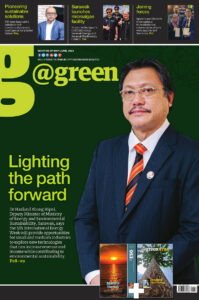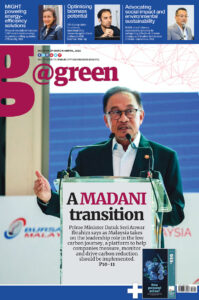Bursa Malaysia works with the London Stock Exchange group to roll out the Centralised Sustainability Reporting platform
BY DANIAL FAUZI
BURSA Malaysia is rolling out a Centralised Sustainability Reporting Platform in collaboration with the London Stock Exchange Group (LSEG).
This Platform will give public-listed companies and non-listed SMEs a method to measure their carbon emissions impact.
It will also assist companies in disclosing standardised common ESG data in a way that conforms to established global standards.
This Platform could be a critical factor in enabling the nation’s crux to a greener future and supporting sustainable development while simultaneously creating high-skill jobs for the people to progress towards a high-income country.
In his speech when opening Invest Malaysia recently, Prime Minister Datuk Seri Anwar Ibrahim said Malaysia was open to the demands of ESG.
“We are open and seek to accelerate the transition and transformation of industries and local players towards ESG adoption, even for SMEs,” said Anwar.
“As Malaysia takes on the leadership role in the low carbon journey, a platform to help companies measure, monitor and drive carbon reduction should be implemented.”
Within two weeks of the Prime Minister’s announcement, two listed government-linked companies, Malayan Banking Bhd and UMW Corp, signed a Memorandum of Collaboration (MoC) with Bursa Malaysia to become pioneers of the Early Adopter Programme (EAP) of the Centralised Sustainability Reporting platform.
The MoC was signed On March 22 between Bursa Malaysia CEO Datuk Muhamad Umar Swift, Maybank’s Group President & CEO Datuk Khairussaleh Ramli and UMW’s Group President & CEO Datuk Ahmad Fuaad Kenali.
A GREATER DEGREE OF URGENCY NEEDED
KPMG Malaysia’s Head of Sustainability Advisory Services, Phang Oy Cheng, told @green that developing a Centralised Sustainability Reporting Platform would go a long way in enabling greater transparency for third parties to evaluate the quality of sustainability reports in Malaysia.

It would also enable companies − both public-listed companies and non-listed entities − to calculate their carbon emission impact and disclose standard ESG datasets in a standardised manner that complies with established global standards, such as the Task Force on Climate-Related Financial Disclosures (TCFD).
“However, for the Platform to serve this purpose, there are requisites that we must be mindful of – including data quality (materiality and validity) and the adopted methodology of the ESG information disclosure frameworks/standards (“rule-based” vs “principle-based”),” she said.
On how this latest initiative by Bursa would align with the ESG standards currently being reported by listed companies, she noted: “The current reporting ecosystem had been a work in progress for more than a decade, and there is a broad base of dissatisfaction among investment industry stakeholders with the present position on data and reporting.
“Going forward, we can expect a greater degree of urgency from the industry to make significant progress, with a stronger framework likely to emerge, albeit slowly.”
She said in January 2019, the World Economic Forum, in collaboration with Allianz SE and the Boston Consulting Group, suggested the following actions:
- Improved transparency of the entire ecosystem (such as alleviating duplication of activity and unintentional conflicts)
- Effective and active cross-system interactions (such as incorporating more of the end user’s needs)
- Stricter harmonisation of methodologies for measuring key performance indicators (KPIs) related to ESG (such as enhancing the comparability of KPIs to help the decision-making of investors and others)
“Steps to adopt this have already been taken by Bursa Malaysia as reflected in the latest Sustainability Reporting Guide published in September 2022.”
She hoped the efforts to develop the Centralised Sustainability Reporting Platform would consider the constraints that arose in enabling ease of access and review for the quality of data produced, and harmonisation of reporting standards and their requirements.
“This is to ensure principle-based guidance such as the Integrated Reporting and TCFD (in part) are adequately provided for and aligned with the reporting frameworks such as the Global Reporting Initiative (GRI),” she said.
A GREENER AND MORE SUSTAINABLE ECONOMIC GROWTH
Besides the reporting platform, Anwar said in his speech that green businesses were crucial to economic sustainability and all life and its attendant qualities.
“Our country is blessed with some of the world’s oldest rainforests, and our seas are recognised as one of the richest reservoirs of biodiversity. They must be protected as they are valued assets blessed by the Almighty.
“However, as technology and the virtual landscape advance, so do the nation’s needs. Since our country is a major trading nation, efforts will be spent on expanding and improving airport capacity in Penang and Subang, which Malaysia Airports Holdings will lead in addition to sea access via Sanglang Port in Perlis.”
In addition to these key infrastructure developments, establishing technology hubs in Penang and Johor and the potential of Sabah and Sarawak in competitive energy costs will also attract much interest and secured investments.
Additionally, financing support will also be available through Bank Negara Malaysia. Funds will be provided to SMEs and other startups to implement green and low-carbon practices. Other forms of help would be via Technology Financing Scheme, Investment Tax Allowance and Income Tax Exemption for eligible activities.
Investments will also be made in green growth areas, including hydrogen technology, bioenergy and electric mobility – enablers of green adoption across sectors and future economic engines.
NET ZERO CARBON FOOTPRINT
In his speech, The Prime Minister also said efforts would be focused on lowering thenation’s carbon footprint. A key element in this concept will emphasise the development of Technical and Vocational Training (TVET).
TVET is being redesigned for further participation in the private sector, while in conventional academia, updates on university syllabi are being developed.
Additionally, Anwar expressed optimism towards projects within this field growing to a point where Malaysia’s Voluntary Carbon Market operated by Bursa Malaysia could be used.
The Bursa Carbon Exchange (BCX) launched in December last year would spearhead the acceleration towards and net zero future.
To support this national journey, Anwar announced the government was committing a seed fund of RM10 million as an assured demand of Malaysian-generated carbon credits to kickstart the journey.
He said that in this journey to secure the environment’s future, it was only natural that further development and support should be through Islamic finance. In this field, Malaysia is recognised as a longstanding global leader.
Therefore, the government was committed to enhancing this field further through the Securities Commission Malaysia, which will extend the Waqf-Featured Fund Framework to include Islamic Real Estate Investment Trusts (REITs) and Islamic Exchange Traded Funds (ETFs). – @Green








